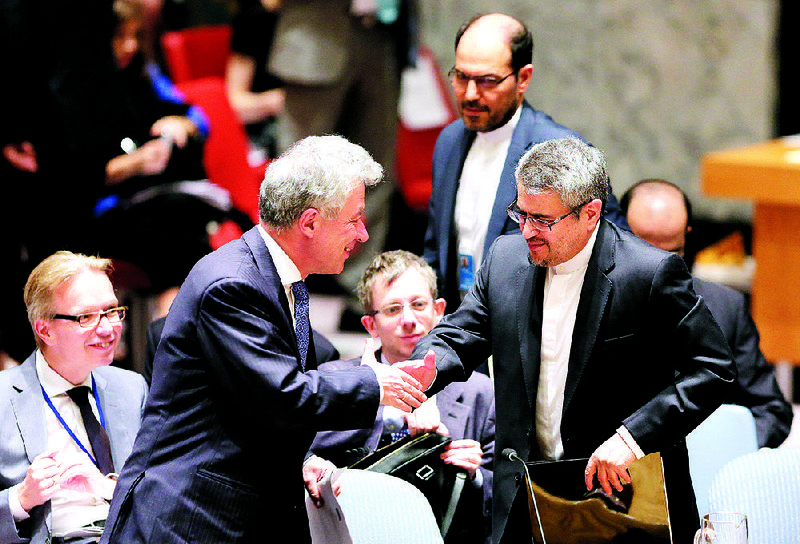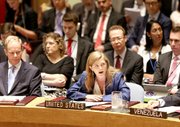UNITED NATIONS -- The United Nations Security Council on Monday unanimously endorsed the landmark nuclear deal between Iran and six world powers and authorized a series of measures leading to the end of U.N. sanctions that have hurt Iran's economy.
But the measure also provides a mechanism for U.N. sanctions to "snap back" in place if Iran fails to meet its obligations.
Both U.S. Ambassador Samantha Power and Iran's U.N. Ambassador Gholamali Khoshroo called the agreement an important achievement for diplomacy, the Iranian promising to be "resolute in fulfilling its obligations" and the American pledging to be vigilant in ensuring they are carried out.
The resolution had been agreed to by the five veto-wielding council members, who along with Germany negotiated the nuclear deal with Iran. It was co-sponsored by all 15 members of the Security Council. The European Union's foreign ministers endorsed the agreement later Monday in Brussels and pledged to implement it.
Under the agreement, Iran's nuclear program will be curbed for a decade in exchange for potentially hundreds of billions of dollars' worth of relief from international sanctions. Many key penalties on the Iranian economy, such as those related to the energy and financial sectors, could be lifted by the end of the year.
Iran insists its nuclear program is purely peaceful, aimed at producing nuclear energy and medical isotopes, but the U.S. and its Western allies believe Tehran's real goal is to build atomic weapons. President Barack Obama has stressed that all of Iran's pathways to a nuclear weapon are cut off for the duration of the agreement, and that Iran will remove two-thirds of its installed centrifuges and get rid of 98 percent of its stockpile of uranium.
The United Kingdom's U.N. Ambassador Matthew Rycroft said "the world is now a safer place in the knowledge that Iran cannot now build a nuclear bomb." But Israel's U.N. Ambassador Ron Prosor told reporters immediately after the vote that the Security Council had "awarded a great prize to the most dangerous country in the world," calling it "a very sad day" not only for Israel but the entire world.
The document specifies that seven resolutions related to U.N. sanctions will be terminated when Iran has completed a series of steps to curb its nuclear program and the International Atomic Energy Agency has concluded that "all nuclear material in Iran remains in peaceful activities."
All provisions of the U.N. resolution will terminate in 10 years, including the "snap back" provision on sanctions.
But last week the six major powers -- the U.S., Russia, China, Britain, France and Germany -- and the European Union sent a letter informing U.N. Secretary-General Ban Ki-moon that they have agreed to extend the snap back mechanism for an additional five years. They asked Ban to send the letter to the Security Council.
Obama told reporters the vote will send a strong message of international support for the agreement as the best way to ensure "that Iran does not get a nuclear weapon." He faces strong opposition in the Republican-controlled Congress, which has 60 days to review the agreement, and expressed hope that members will pay attention to the vote.
In a bipartisan letter released Monday, 60 national security leaders, ambassadors, military leaders and former Cabinet secretaries signed a letter in support of the nuclear deal with Iran.
The group of signatories includes former Secretary of State Madeleine Albright; former national security advisers Zbigniew Brzezinski and Brent Scowcroft; former Sens. Nancy Kassebaum, Tom Daschle, Carl Levin and George Mitchell; former defense official Michele Flournoy; and Thomas Pickering, the former ambassador to Israel, Russia, India and the United Nations.
"No agreement between multiple parties can be a perfect agreement without risks," the letter said. "We believe without this agreement, the risks to the security of the U.S. and its friends would be far greater. We have also not heard any viable alternatives from those who oppose the implementation" of the deal.
Meanwhile, on a visit to Israel, U.S. Defense Secretary Ashton Carter offered personal assurances Monday that the U.S. will help Israel counter Iranian support for the militant group Hezbollah. He called it one example of how the U.S. can support the Jewish state after the Iran nuclear deal.
"Hezbollah is sponsored of course by Iran, which is why the United States will continue to help Israel counter Iranian malign influence in the region," Carter told reporters after receiving an Israeli security briefing in the area.
Carter hit the same theme later at a joint news conference in Tel Aviv with Israeli Defense Minister Moshe Yaalon. They used the appearance to make a public show of unity at a low point in U.S.-Israeli relations heavily strained by Israeli's opposition to the Iran deal.
Yaalon warmly praised Carter's track record of support for Israel, while acknowledging the split over the Iran deal.
"We greatly disagree when it comes to the agreement with Iran and fear for the future in the aftermath of its signing," Yaalon said. "Yet we discuss this issue in a fully open manner, alongside many other issues of great importance."
Carter acknowledged tensions over the Iran deal.
"Friends can disagree about whether it will work," he said, "and we will be watching Iran very closely to see. But there's no disagreement about the ultimate objective. We cannot let Iran have nuclear weapons. And there's no disagreement about the threats Israel sees every day from Iran's destabilizing activities, from terrorists like Hezbollah and Hamas."
Carter is to meet today with Prime Minister Benjamin Netanyahu, who has called the Iran deal a mistake of historic proportions. Afterward, the U.S. defense chief will fly to Jordan to consult with government officials there and visit a base used in the fight against the Islamic State extremist group.
Information for this article was contributed by Robert Burns, Zeina Karam, Josef Federman and Deb Riechmann of The Associated Press.
A Section on 07/21/2015

